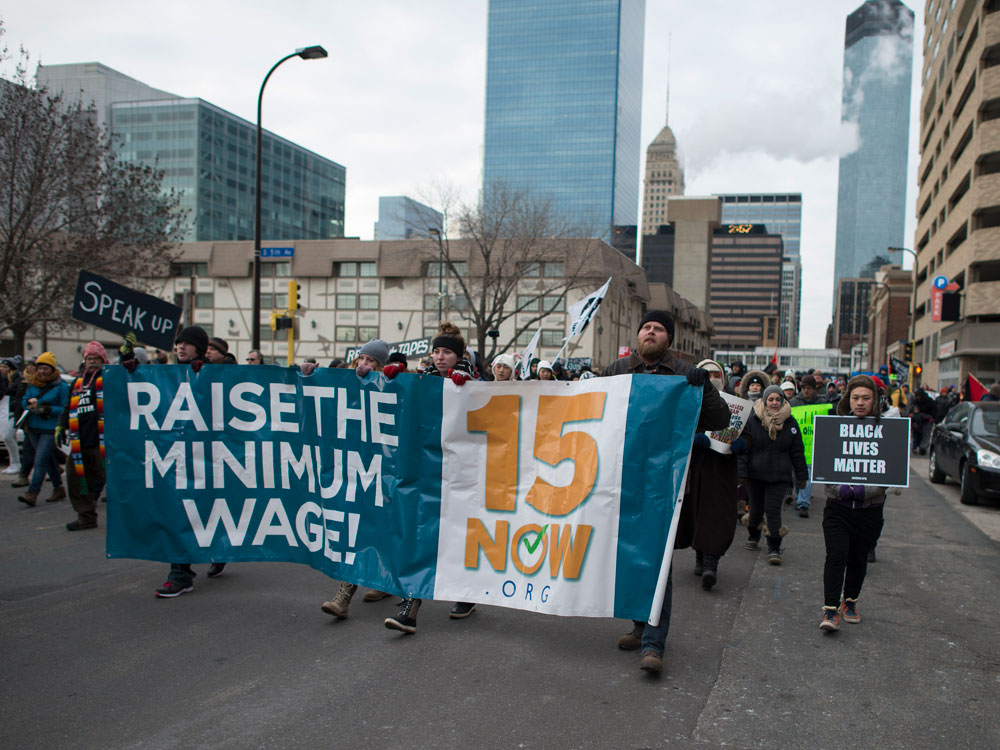
January 7, 2020; Fast Company
Increasingly, economics research shows that raising the minimum wage, even to $15 an hour, does little to increase unemployment. Meanwhile, University of California, Berkeley economists Anna Godøy and Michael Reich note that the evidence is high that increased minimum wages “reduce poverty rates among households and children.”
But the benefits of raising the minimum wage are not only economic. As Kristen Toussaint writes in Fast Company, new evidence that suggests raising the minimum wage could reduce the suicide rate among Americans, particularly those with a high school education or less. This is no small thing, considering that 25 states saw suicide rates rise 30 percent between 1990 and 2017, and overall the nation has seen life expectancy slip in each of the last three years.
A recent study in the Journal of Epidemiology & Community Health found a $1 increase in the minimum wage is linked to a 3.5 to 5.9 percent drop in the suicide rate among high-school educated Americans.
Despite the success of the Fight for $15 in cities and states around the country, the federal minimum wage has been stagnant for over a decade, a mere $7.25 per hour. The variation in minimum wage raises, however, provided rich data for lead author John Kaufman and his team.
Sign up for our free newsletters
Subscribe to NPQ's newsletters to have our top stories delivered directly to your inbox.
By signing up, you agree to our privacy policy and terms of use, and to receive messages from NPQ and our partners.
Their study examined monthly data from 1999 to 2017 for all 50 states and Washington DC, tracking suicide rates, state and federal minimum wage, changes in state minimum wages, and unemployment data. As Kaufman told Fast Company, the researchers found that “when minimum wages were increased, suicide rates went down on average.” He also noted, “We found the potential protective effect of higher minimum wage on reducing suicide is stronger when unemployment rates are higher.”
Notably, increases in the minimum wage did not impact the suicide rate of college-educated workers. These workers are far less likely to work at minimum wage jobs, and therefore are less affected by raises in the minimum wage.
From the data they collected, Kaufman and his team predicted how many suicides might have been prevented with a $1 or $2 increase in the minimum wage following the recession in 2009, when unemployment peaked. A $1 increase in the minimum wage could have prevented nearly 14,000 suicides between 2009 and 2015 among adults between the ages of 18 to 64 with a high school education or less. A $2 increase could have prevented nearly 26,000 suicides. Over the entire period of the study, 1990 to 2015, the researchers predict that a $2 increase in the minimum wage could have prevented over 57,000 suicides.
The downward pressure on wages over several decades, no doubt, contributes to what have been called “deaths of despair” in US rural and working-class communities.
Says Kaufman, “Policymakers have the power to make these changes. There are upstream or macro-level societal factors that affect people’s health, that affect mental health.” Individual solutions to despair such as antidepressants and better mental health care will not solve a problem created by the lack of quality jobs that provide respect and dignity. Increasing the minimum wage, says Kaufman, is a “lever you can pull to improve people’s well-being or health from a societal level.”—Karen Kahn











